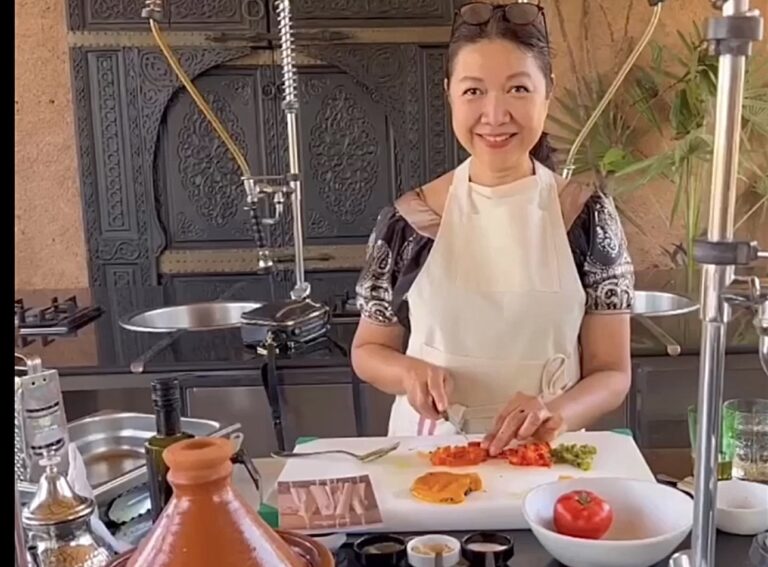
In the heart of the souk district, the exquisite La Sultana Marrakech is a true testament to Morocco’s rich heritage. It’s the best place to learn how to cook Moroccan food too.
In any country, a culinary experience here is more than just about learning recipes. It’s a journey into the heart of a country’s culture. Morocco is no different and there is a cooking lesson on offer in practically every neighborhood of the Medina of Marrakech.
However, at La Sultana Marrakech, the cooking lesson is an authentic exploration of Morocco’s vibrant flavors. The hotel’s Moroccan chef taught us how to whip up a richly flavored roasted eggplant salad and a chicken tagine accompanied by fluffy couscous in one morning. We ended the experience with an elaborate Moroccan tea ceremony on the rooftop and lunch by the pool.
Exotic Moroccan Spices and Ingredients
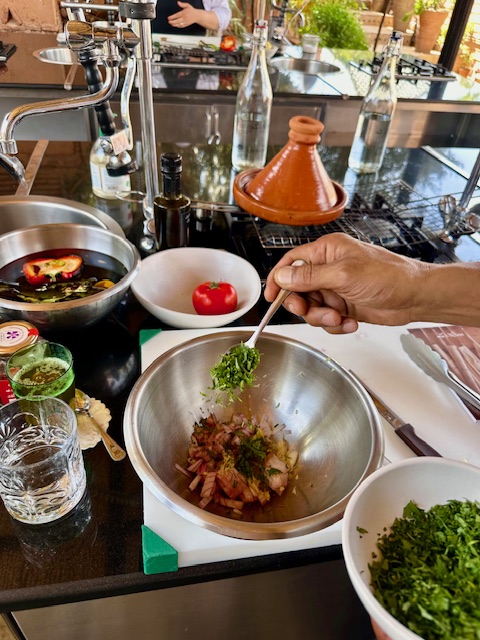

The experience began with an introduction to Morocco’s most iconic ingredients in La Sultana’s rooftop kitchen. This kitchen, created just for cooking classes, offered views of the Medina of Marrakech and the ancient Sadian tombs next door. Truly lovely options for a wandering eye in case you’re tired of watching your tagine cook.
Meanwhile, the lady chef, a master of Moroccan cuisine, introduced me to the Moroccan pantry. Aside from fresh herbs, on the counter were cinnamon, saffron, and Morocco’s signature ras el hanout, a spice blend that harmonizes over 30 spices.
Roasted Eggplant Salad: A Moroccan Mezze Classic
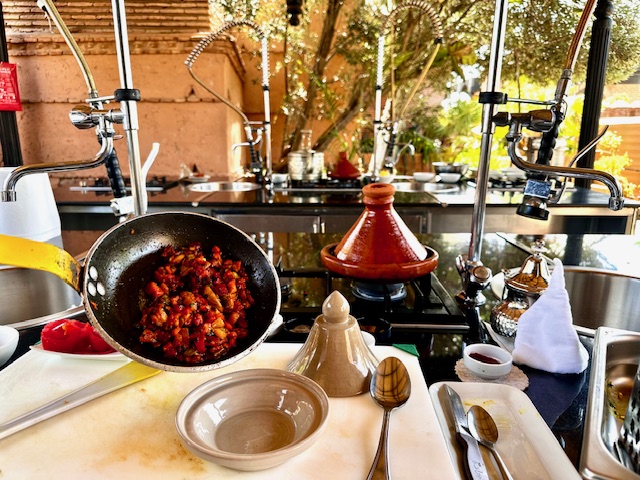
To start, the chef guided us through the preparation of zaalouk, a traditional Moroccan roasted eggplant salad. This dish, like many Moroccan mezze dishes, embodies simplicity and depth in equal measure. We began by roasting the eggplants until their skins charred and the flesh turned tender and smoky.
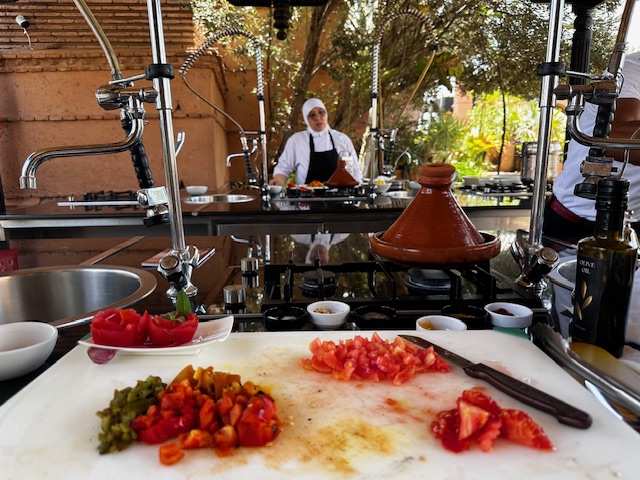
Once roasted, we peeled and mashed the eggplant, blending it with fresh tomatoes, garlic, olive oil, cumin, and paprika. Each ingredient enhanced the eggplant’s smoky depth, creating a velvety texture. Garnished with fresh herbs, the salad was both humble and elegant, showing us how Moroccan cuisine celebrates vegetables with care and creativity.
Traditional Moroccan Tagine
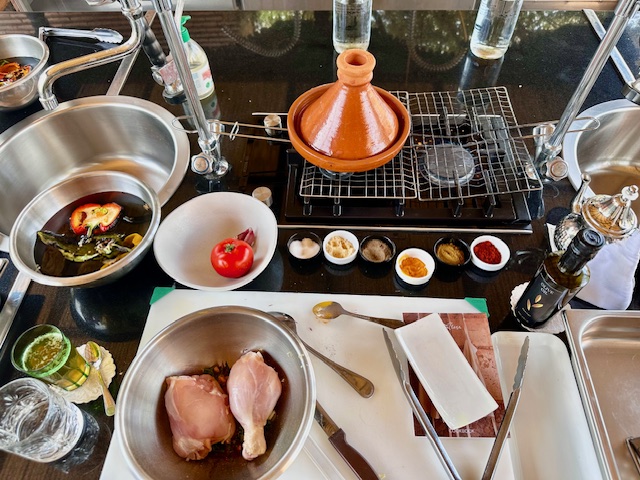
Then we proceeded to the ubiquitous Moroccan tagine. This is a slow-cooked dish that is as beautiful to look at as it is flavorful. We first layered sliced onions and a selection of vegetables to form a colorful, balanced foundation. Our chef demonstrated the art of arranging each ingredient with purpose, explaining how the tagine is not just a meal but a visual composition.
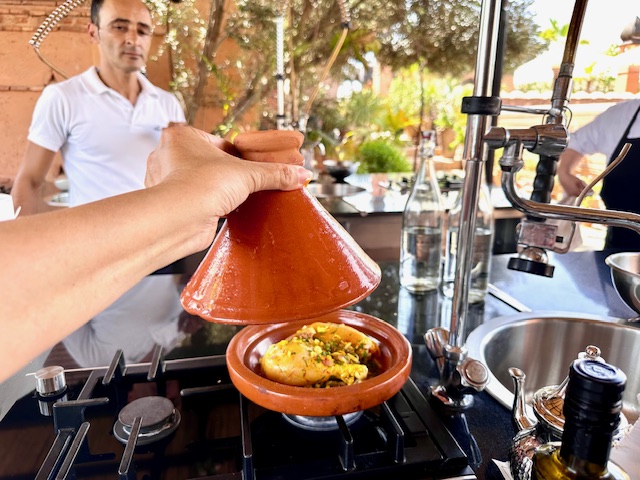
Then we added the chicken along with a mixture of spices and a handful of dried lemons and olives. Each chef — as well as each Moroccan family — has his or her own tagine recipe, usually passed down through generations. So no matter how many times you eat a tagine in Morocco, each one is different in some way.
The cooking process is slow and intentional, allowing the spices to infuse deeply into the meat. This creates a harmony of flavors that slowly unfold while simmering on a low flame.
READ ABOUT THE MOST BEAUTIFUL HACIENDA IN ANDALUCIA
The Art of Couscous:
Next, we turned our attention to couscous, an art that requires both precision and patience. Unlike ordinary grains, couscous is steamed multiple times, with a ritualistic fluffing between each steaming. Yes, it’s way harder to make than it looks; although not impossible. Our chef said she makes it for her family twice a day, after all.
We carefully rolled the grains with olive oil, allowing each grain to steam separately. This is the secret to achieving the light, airy texture.
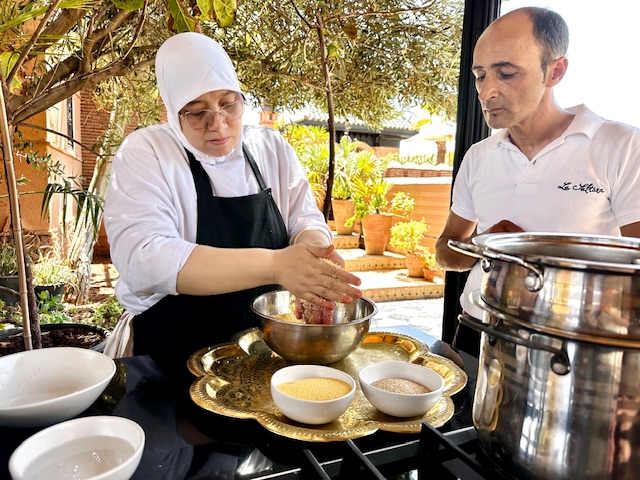

Between steamings, we added an array of seasonal vegetables, which we arranged to cook over the couscous, infusing the grains further with their flavors. Each step was taken with care and reverence. By the final steaming, the couscous was tender and fragrant, each grain soft yet distinct, ready to accompany the tagine. We were ready too — to eat, that is.
The Moroccan Tea Tradition
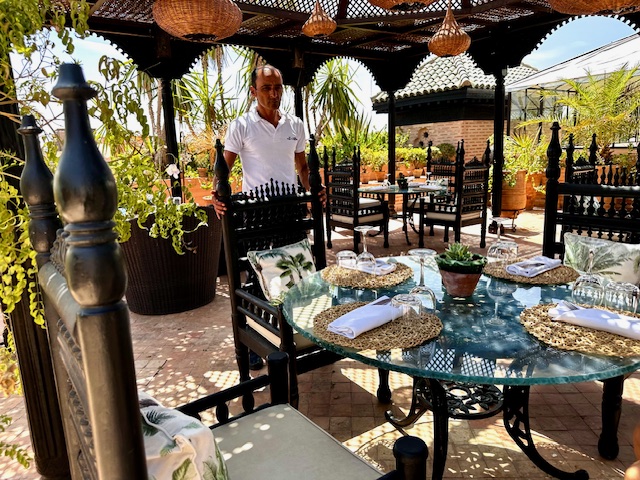
With our dishes nearly complete, we gathered around a low table to experience one of Morocco’s most cherished traditions. The Moroccan tea ceremony is more than just a simple refreshment. It is a ritual of hospitality, a gesture of welcome and warmth. Our chef placed an exquisite Moroccan tea set on the table, complete with a silver teapot and glasses decorated in intricate patterns.
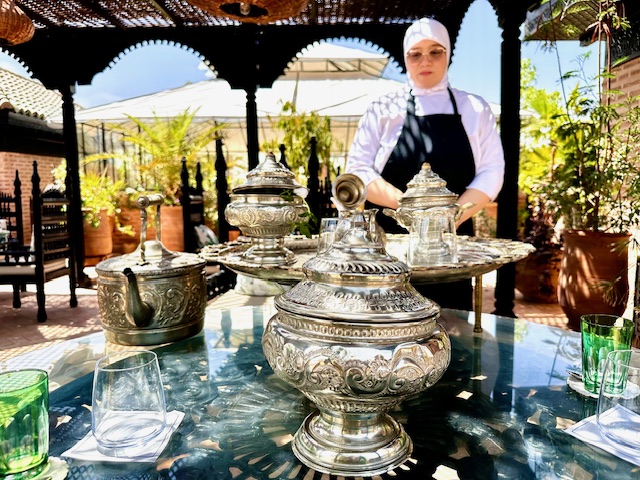
Then she expertly brewed the tea with fresh mint, green tea leaves, and a generous amount of sugar. Then it was time for some magic. She poured the tea from high above each glass, creating a gentle foam that signifies skill and respect for the craft. Watching this ritual unfold, I understood that tea in Morocco is not only enjoyed as a beverage. It is revered as a symbol of friendship and hospitality.


Sipping the sweet, aromatic tea as our poolside table was set for lunch, I felt completely immersed in the Moroccan spirit of graciousness and community. The tea ceremony allowed me to reflect on the morning’s culinary lessons, and to savor the ambiance of La Sultana’s rooftop, with its unparalled views of the ancient medina.
A Taste of Morocco

Finally, it was time to enjoy the meal we had cooked. Sitting at a beautifully arranged table by the swimming pool, I took my first bite of the tagine. It was tender and flavorful. The chicken, spices, dried lemons, and olives came together in a beautiful balance of flavors. T
Meanwhile, the couscous, fluffy and aromatic, was the perfect accompaniment. Each grain soft yet structured. The roasted eggplant salad added a contrasting depth, its smoky flavors complementing the sweetness of the tagine.
Every bite transported me deeper into the rich culinary traditions of Morocco. As I enjoyed the fruits of our labor, the chef shared stories of Moroccan cooking as a way to connect with family, community, and heritage. This experience went beyond recipes—it was an invitation to experience Morocco’s soul.
A Lasting Memory at La Sultana Marrakech

The tagine and couscous cooking lesson at La Sultana Marrakech left me with more than culinary skills. It offered a glimpse of the Moroccan way of life, where food is prepared with reverence and shared with love.
From the intricate techniques of crafting couscous to the ritual of the tea ceremony, every moment at La Sultana was crafted with sophistication and care. This experience was a reminder that food is more than sustenance. It’s a way to connect, share, and celebrate culture. Leaving La Sultana, I carried with me the warmth of the people who bring Morocco’s culture to life with every meal.


